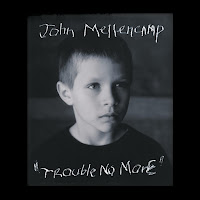V2.55
True story. A few years ago, I had the good fortune to be seated next to the beautiful and talented Roseanne Cash and (then) husband Rodney Crowell at a Nashville performance by Joe Jackson. At the finish of a wonderful a cappella rendition of Jackson’s “Is She Really Going Out With Him,” some clown yelled ‘play “Free Bird”’ referring, of course, to the Lynyrd Skynyrd song. “Only in Nashville,” I commented to my buddy Willie J. Cash leaned over and gently corrected me, saying “no, dear, they yell that everywhere...”
Evidently John Eddie has heard these cries as well, recording a song titled “Play Some Skynyrd” for his comeback album Who the Hell Is John Eddie? (Lost Highway). A lot of water has passed beneath the bridge in the fifteen years or so since Eddie sank into relative obscurity after his mid-80s hit “Jungle Boy,” but Who The Hell Is John Eddie? proves that you can’t keep a true artist down. A blend of alt-country and barroom roots rock, Eddie imbues the album with a mountain of soul, passion and grit. From the heartbreak of “Let Me Down Hard” to the hilarious middle-aged lament “Forty,” Eddie shows great maturity as a singer/songwriter on these tales of love and loss and life on the road. As for “Play Some Skynyrd,” Eddie’s self-effacing humor sounds suspiciously like the tears of a clown, expressing the frustration and elation felt by every rock & roller who has ever played to a hostile audience. With hot licks from guitarist Kenny Vaughn, “Play Some Skynyrd” is an artistic catharsis showing that, for John Eddie, the ride isn’t over yet.
John Mellencamp has always drawn from the rootsier side of music, mixing rock with elements of blues, bluegrass and sweet soul music. It should come as no surprise that Mellencamp should choose to record an album of traditional American music like Trouble No More (Columbia Records). Drawing from the wealth of material available, Mellencamp revisits old masters like bluesmen Robert Johnson (“Stones In My Passway”) and Son House (“Death Letter”), folk legend Woody Guthrie, alt-country diva Lucinda Williams, Willie Dixon and Hoagy Carmichael. Mellencamp’s performances are truly inspired, the band rocks, and the song selection is tough to beat. As a result, Trouble No More is a simple delight, a heartfelt homage to the music that served to inspire Mellencamp’s own songwriting. He may not top the charts with the regularity that he once did, but John Mellencamp remains a complex and entertaining performer.
“Summer is right for fighting in the street,” Mick Jagger sang and Boysetsfire has taken the legendary rocker to heart. Following up on the success of last year’s EP, Tomorrow Come Today (Wind-Up Records) offers BSF fans an album-length dose of the band’s trademark socio-political commentary. Not as strident as, say, Corporate Avenger, Boysetsfire stomps across much of the same radical leftist lyrical turf with a musical attack that is equal parts nu-metal and hardcore punk. Boysetsfire vocalist Nathan Gray is a charismatic frontman with lungs of steel, guitarists Chad Istvan and Josh Latshaw slash-and-burn with blistering chainsaw riffs. Throw in an explosive rhythm section that offers piston-like consistency and you have a recipe for success. Angry young men (and women) will latch onto anthemic rockers like “Dying On Principle” and “Release the Dogs,” so expect to hear a lot of Boysetsfire on the radio this summer.
Sometimes great music is the result of years of hard work and training and sometimes it happens purely by accident. In the case of the Thorns, it may be a little bit of both. Matthew Sweet, Shawn Mullins and Peter Droge all enjoyed various degrees of success as singer/songwriters, but somewhere down the line, Fate put them all together in the same room at one time. The trio of talents discovered that…lo and behold…their three voices sounded pretty damn good together and a band was born. Their self-titled album The Thorns (Columbia Records) is sheer joy for music lovers who enjoy vocal harmonizing and gentle folk-rock-inspired songwriting.
The closest comparison that I can make is to Crosby, Stills and Nash, tho’ I’d give the Thorns an edge in songwriting (just listen to the Beatlesque “Thorns” or the ethereal “Dragonfly”). The album’s production, by Brendan O’Brien (best known for his work with Pearl Jam), is both delicately textured and amazingly sympathetic. The Thorns rock when they need to rock and bring it down a notch when the material demands subtlety, the trio of Sweet, Mullins and Droge discovering a wonderful chemistry together and delivering the classiest release of 2003.
Critics have begun commenting on a “heavy metal revival,” ignoring the convenient fact that, for fans of the genre, heavy metal never went anywhere in the first place. Perhaps a jolt of Stratovarius from the band’s Elements Pt. 1 (Nuclear Blast) will shake these dolts (who typically dismiss metal with a sigh and the wave of their hand) from their ignorance. These Finnish rockers have carried the power metal torch since the early-80s, and the release of Elements Pt. 1 shows why Stratovarius is in a league of their own.
The album’s elegant production lends a sense of neo-classical grandeur to songs like “Eagleheart” or “Learning To Fly,” Timo Kotipelto’s vocals soaring above the music while guitarist Timo Tolkki’s axe cuts through the material like a scalpel. The rhythm section hits like a brick wall at 100mph, the keyboard work is fascinating and the stories told by each song are epic in scale. The operatic poetry of Elements Pt. 1 shows heavy metal at its best. Put Stratovarius on the box, crank up the volume and prepare to take flight! (View From The Hill, April 2003)




No comments:
Post a Comment